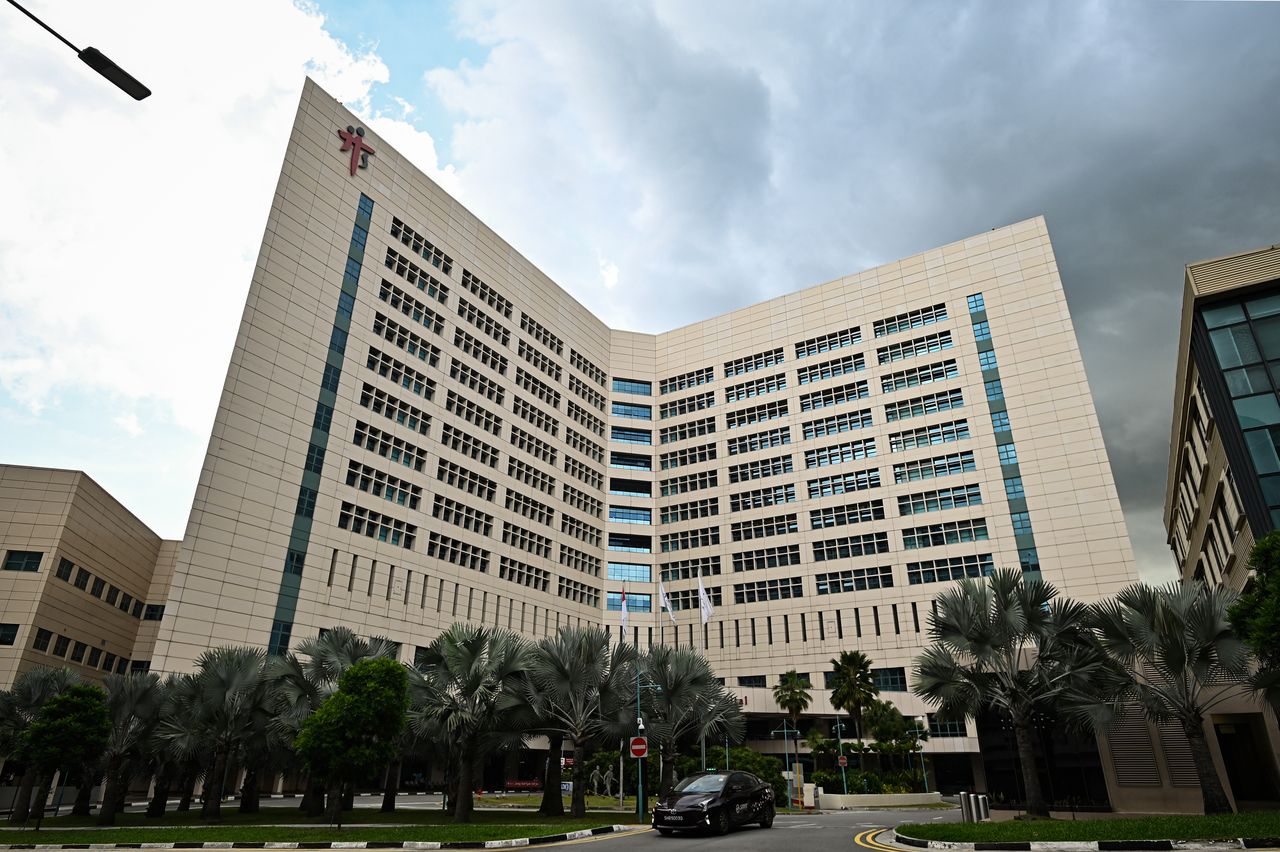TTSH Covid-19 cluster sparked by new variant that originated in India
Sign up now: Get ST's newsletters delivered to your inbox

The growing Covid-19 cluster at Tan Tock Seng Hospital has been fuelled by new, more transmissible variants of the virus.
ST PHOTO: LIM YAOHUI
SINGAPORE – New viral variants that originated in India - and are fuelling the devastating second wave there - are believed to have sparked Singapore’s largest active cluster at Tan Tock Seng Hospital (TTSH).
Seven cases in three local clusters were found with B.1.617.2, a sublineage of a variant from India, said Ministry of Health (MOH) director of medical services Kenneth Mak on Tuesday (May 4).
Of these, five are part of the TTSH cluster, which has grown to include 40 TTSH staff, patients and their relatives. One of the five is the first case in the cluster – the 46-year old nurse who tested positive for Covid-19 on April 27.
The sixth case with that variant is an Immigration & Checkpoints Authority (ICA) officer deployed at Changi Airport Terminal 1 and the seventh is a cleaner deployed at a community care facility at Tuas South.
“The new variant strains have higher attack rates. They are more infectious and they are causing larger clusters than before,” said Education Minister Lawrence Wong, who co-chairs the ministerial task force combating the virus.
“We have tried our best to ringfence the cases through contact tracing, but we must assume that there are still hidden cases out there in the community.”
Viruses mutate all the time, and the B.1.617.2 variant was first detected in India in October last year. It has been dubbed the double mutant because it has two major mutations on the spike protein of the coronavirus.
As the cases in India surged, many countries have placed restrictions on travellers from the country. Prof Mak also said at the press conference that more cases of worrisome variants that are circulating around the world have been identified among the 60 new community cases that have emerged in the past week.
Apart from the seven B.1.617.2 cases, there were also three local cases with the B.1.617.1 variant, another sublineage of the double mutant variant first detected in India.
Furthermore, MOH has detected eight local cases with the B.1.351 variant that originated in South Africa, seven local cases with the B.1.1.7 variant that originated in the United Kingdom, three local cases with the P.1 variant that originated in Brazil, and one local case with the B.1.525 variant that also originated in the UK.
In addition, there were four re-infection cases with the B.1.351 variant, said Prof Mak.
He noted that seven cases in the three clusters have the B.1.617.2 variant but the viruses in each cluster were “phylogenetically distinct”, suggesting that the clusters are not linked to one another.
On how the TTSH cluster spread, Prof Mak said one possibility being studied is that there may be issues with the airflow and ventilation in the ward. Other hypotheses are also being examined.
He also said that they have started to study travellers coming into Singapore who have recovered from Covid-19.
“We’ve not discounted the possibility that some of these recovered travellers might in fact have reinfections and therefore, bring that in and pose a threat to us,” he said. The TTSH cluster remains a concern, as more cases may emerge among patients who remain in the hospital, the hospital staff and in those who are presently under quarantine.
Earlier in the press conference, Health Minister Gan Kim Yong, had called for Singaporeans to be vaccinated as well as to rally around frontline healthcare workers, especially those from TTSH and the National Centre for Infectious Diseases.
“A kind word of encouragement or a thoughtful deed goes a long way to boost their morale during these difficult times.”
Mr Gan said the healthcare system is being prepared for more Covid cases and the next few weeks will be critical for Singapore. “The silver lining is that we have successfully brought our cases down before and we can do it again.”
List of Covid-19 variants
A total of 29 local cases with the Covid-19 variants were detected, along with 475 imported cases.
Here is the breakdown of the cases with the respective variants:
Two UK strains
B117: detected in seven local cases and 181 imported cases, 11 of which tested preliminarily positive
B1525: detected in one local case, and nine imported cases
B117: detected in seven local cases and 181 imported cases, 11 of which tested preliminarily positive
B1525: detected in one local case, and nine imported cases
South African strain (B1351): detected in eight local cases (including four reinfection cases involving recovered workers at Westlite Woodlands Dormitory) and 158 imported cases
Three Brazilian strains:
P1 (B11281): detected in three local cases and four imported cases
P2 (B11282): detected in one imported case
P3 (B11283): detected in one imported case
P1 (B11281): detected in three local cases and four imported cases
P2 (B11282): detected in one imported case
P3 (B11283): detected in one imported case
Four Indian strains:
B1617: detected in 57 imported cases
B16171: detected in three local cases and 11 imported cases
B16172: detected in seven local cases and 52 imported cases
B16173: detected in one imported case
B1617: detected in 57 imported cases
B16171: detected in three local cases and 11 imported cases
B16172: detected in seven local cases and 52 imported cases
B16173: detected in one imported case


